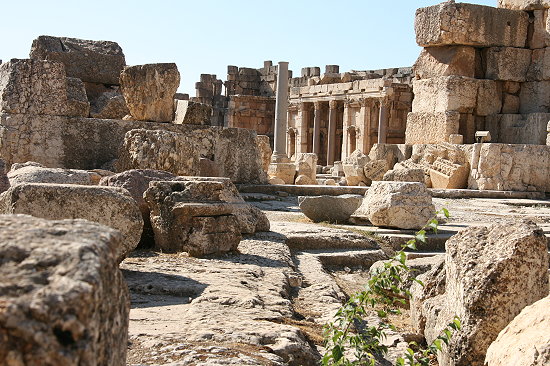
The Arab heritage is so closely linked to Islam that the one cannot be separated from the other. The Qur’ān expresses this textually in that it was ‘revealed (in Arabic)’,[1] while the Arabic heritage is centred on a number of themes causing a cultural backwardness regardless of the natural riches granted to the Arabs.
THE FIRST OF THESE THEMES is oneness – in that Islam laid emphasis on the oneness of the deity, and where the system of governance has been characteristically monarchic. This oneness results in political tyranny. For just as the Arab divinity exalts whom He wills and brings low whom He wills and tolerates all manner of crime provided the Muslim does not associate with Him any partners:
Lo! Allah forgiveth not that a partner should be ascribed unto Him. He forgiveth (all) save that to whom He will. Whoso ascribeth partners to Allah, he hath indeed invented a tremendous sin [Qur’ān IV,48]
Lo! Allah pardoneth not that partners should be ascribed unto Him. He pardoneth all save that to whom He will. Whoso ascribeth partners unto Allah hath wandered far astray [Qur’ān IV,116]
… Arab leaders over history have behaved in similar fashion.
The second theme is the acceptance of that which is absolute and the rejection of that which is relative. The Qur’ān exonerates Muslims of any criminality and lays down in the text:
Shall we then treat those who have surrendered [i.e. become Muslims] as We treat the guilty? [Qur’ān LXVIII,35][2] and
Ye are the best community that hath been raised up for mankind.[Qur’ān III,110]
In the prophetic hadith it says: “the best of eras is my era, and the one that follows it” and “the one who wears silk in this lower world shall be held worthless in the afterlife”. Belief in the absolute is reflected in the Arab heritage in more than one arena, and in particular in hostility towards rational logic, for the fact that its starting point is the recognition of that which is relative. Rational logic is the entry point to philosophy and thence into science, which does not recognise fixed certainties but rather acknowledges error through a process of constant experimentation, as the history of science’s development tells us.[3] Arabs and fundamentalists crow about their enmity to logic and joyously repeat Ibn Taymiyya’s dictum: man tamantaq fa-qad tazandaq – “he who practices logic is an atheist.” That is, an adherence to logic constitutes a reason to declare as infidel anyone who thus departs from the Arab/Islamic heritage. Indeed the shafts of excommunication have also been directed at monotheistic Muslims simply for their differing with other monotheistic Muslims like themselves.
Arabs and fundamentalists crow about their enmity to logic
The third theme is absolute obedience – a concept which has been directly imported from the Qur’ān:
Obey Allah, and obey the messenger and those of you who are in authority [Qur’ān IV,59]
It is reflected in the system of governance in that the people do not have the right to oppose the ruler or anyone who has been placed over them, or a member of a religious group does not have the right to oppose his leader, and so on. This is why Arab history is devoid of organised and effective popular revolutions (with the exception of the participation of Arabs agriculturalists who allied with the Egyptians against Arab rulers, or the example of the Qarmati movement[4] which is severely censured in view of the violence it inflicted upon its opponents). As regards the communications revolution, the moderation generation has succeeded in surmounting the scourge of obedience, as was demonstrated in more than one Arab country in January 2011.
The fourth theme is ethnocentrism – this was set in place after the death of Muhammad when the office of caliphate was restricted to the Qurayshis to the exclusion of any other tribe. Muhammad expressed this orientation in a hadith which runs: “the Arabs are not the equal to the Quraysh, nor are the mawālī (protegés) the equal of the Arabs.” Al-Muʽāwiya ibn Abī Sufyān said: “there are three classes of Egyptians: humans (Arabs), humanoids (protegés) and non-humans (Copts)”,[5] while Abu Hanifa opined: “no Arab is the equal of Quraysh and no non-Arab is the equal of an Arab.” Here are Sufyān al-Thawrī and Ibn Hanbal: “If a protegé marries an Arab woman, the contract is to be voided.” This type of heritage accumulated the point that an Arab saying, in reference to the Egyptian peasants, runs: “better let the crocodile eat her before the peasant takes her”.
Ethnocentrism and religious chauvinism are the most important causes for the enmity expressed by Arabs and Muslims towards those among them who differ, and indeed even towards European peoples who have allowed them to live and work in their countries. Their charming response is to declare as infidel those who have helped them to enjoy a respected and free mode of life that is lacking in their own countries. But it doesn’t stop at declaring others infidels; it has got to the point of attempting to impose Islam by force, taking as starting point the dictum adopted from Hasan al-Bannā and Sayyid Qutb: “Muslims are the teachers of the world.”
This fourth theme is founded on the principle that “loyalty to the faith precedes loyalty to the nation” originated by the Iranian Jamāl al-Dīn known as al-Afghānī, and all subsequent fundamentalists. In Egypt it is reflected in daily life where, among the fundamentalists, the saying “Egypt be damned!” is commonplace. We are not far short of a situation where a Muslim from any country may be ruler over Egypt, yet more ominous than that is what is lodged in the mentality of the fundamentalists – that an American or an Afghan Muslim is takes precedence over an Egyptian Christian.
“Loyalty to the faith precedes loyalty to the nation”
The fifth theme is the standpoint on women – she is worth half of a man in matters of inheritance and in the profession of faith. If she is a servant-maid the man has the right to obtain an unlimited number of such as her in accordance with the system ‘what by right arm possesses’ which is laid down in writing in several Qur’ānic verses.[6] In the Qur’ān the husband is the ‘Lord [Baʽal] of the wife,’[7] bearing in mind that the term Baʽal in the Semitic languages (of which Arabic is one) denotes ‘owner’. In the Old Testament the word refers to the Canaanite gods, in that Baal was worshiped in the Bekaa Valley and subsequently transferred to the Qur’ān, which acknowledges so much in Sūrat al-Sāffāt:
Will ye cry unto Baal and forsake the best of creators? [Qur’ān XXXVII,125]
The husband thus attains over his wife to the status of a god. Thus in the Prophetic hadith we have: “People shall not prosper who appoint a woman ruler over them,” while the Al-Azhar education system in Egypt teaches students that guardianship is not permissible if “the woman is not as a carpet before her husband or lord”. He learns too that the (free) Muslim may marry up to four free-born Muslim women (with the permission to accumulate an unlimited number of female slave-girls. The unfree Muslim may marry only two women since his worth is half that of a freeborn Muslim).

Suggested Reading
The late Khalīl ʽAbd al-Karīm recalled that one of the more interesting Arab sayings runs: “the man is nobler than the woman,” and in his researches on Arabic linguistics he noted that the standpoint of the Arab towards women:
goes to explain the position of Arab culture in this regard, and the way it prohibits a woman from acceding to a number of offices, a fact which this confirms that this culture is bound up with a specific environment, and demonstrates that women in the Arab heritage are ‘entirely deficient.’[8]
The foregoing theme, by way of example, demonstrates the organic relationship between the Arab heritage and the Arab mindset, even in such matters as language, according to Khalīl ʽAbd al-Karīm. For he observed that in Bedouin society it was impossible for a civilised language to come about
since language is a mirror that reflects the forms of human behaviour … and the Arabic language in its roughness and harshness reflects its environment. For this reason the Arabs stood on the lowest rung of the cultural ladder, and indeed it would not be an exaggeration to say that they were at the forefront of peoples that stood in opposition to civilisation. Despite this, whenever Arabs mingled with more developed peoples, after they occupied and colonised their lands and stole their wealth and regarded as fair game the sweat of their peasants – they haughtily and arrogantly dubbed them ‘oafs’.[9]
Ibn Khaldun noted that the Arabs were the furthest removed from civilised culture, and for this reason did not contribute to the crafts, as opposed to China, India and the land of the Copts. Muslim proponents of science, he states, were non-Arabs: “There is nowhere today that is more abundant in culture than Cairo, for it is the mother of the world and the font of science and craftsmanship.” On the other hand savagery is the nature of the Arabs since they are plunderers: “a savage people – for whenever the Arabs gain mastery over lands desolation swiftly follows.” This is related to their standpoint on other cultures, as Ibn Khaldun writes:
Where are the sciences of the Persians which ʽUmar ordered to be wiped out at the time of the conquest? Where are the sciences of the Babylonians and the Copts?[10]
The late Kuwaiti thinker Ahmad al-Baghdādī views the Arabs as having no familiarity in their lives with anything called law, and notes that the term dawla (’state’) is absent from Arabic dictionaries. He explains that
if we look at the question of thinking in a desert environment, where the scope for thought is limited, we find there is no science nor culture, given that Arabs at the time were an illiterate people that could neither read nor write and depended upon an oral culture, uniquely on poetry … Civilisation is associated with this world and has no relation to religion. Here is where the phrase ‘Islamic culture’ misses the mark … neither the Arabic language nor the Islamic faith contain any linguistic term denoting civilisation (cf. ‘philosophy’, ‘mathematics’, ‘sciences’). The religious heritage is devoid of intellect and the world is unable to derive any use from it since it is a particularised, limited heritage.[11]
The author Nadine al-Badīr – a Saudi resident in Paris – writes that
Arabs commit suicide in the name of morals … in the name of religion they have turned themselves into a sickness and a disgrace in a world that is heading off into outer space. We on the other hand are heading off into the torment of the grave. Despite this, sexual harassment is at its height in the Arab world. Where are the morals and where is religion? In Paris and elsewhere a woman can walk however she is dressed without being molested by anyone. In Arab territories she must walk bowed low and fearful of abduction or assault, even if she is veiled. And even if she is safe from that she is not safe from obscene verbal harassment or being pelted with objects, so that she has to raise her arms in prayer to the Almighty for relief. Where is religion and where are the morals? When will Arab society wake up from its delusions?[12]
The Libyan author Abū al-Qāsim Sumayda writes that “the tragedy is that the Arabs have not freed themselves from a mouldy, dust-covered culture; they have not shed the tradition of the Basūs wars[13] or the behaviour of vendettas, plundering and primitive warfare”.[14] Was the Saudi thinker ‘Abd Allāh al-Qusaimī exaggerating when he gave to his his 717-page book the title: The Arabs are a Voice Phenomenon?
[1] Qur’ān XII,2: Lo! We have revealed it, a Lecture in Arabic, that ye may understand.
[2] ‘Guilty’ is the English translation preferred by Marmaduke Pickthall (The Meaning of the Glorious Qur’ān) – the Qur’ānic text has mujrimīn ‘criminals’. The translation by Mohsin Khan (Quran-e-Karim) glosses it thus: Shall We then treat the Muslims (believers of Islamic Monotheism, doers of righteous deeds) like the Mujrimûn (criminals, polytheists and disbelievers)? (Ed.)
[3] See John Gribbin, Science, A History 1543-2001.
[4] The Qarmatians (al-Qarāmita) were a Shī‘a Isma’īlī group dominant in eastern Arabia, particularly Bahrain, where in 899 AD they attempted to establish a utopian republic, a society based on reason and equality and the sharing of property. They considered the pilgrimage to Mecca a superstition and in 930 sacked Medina and Mecca, from whose Kaaba they stole the Black Stone and desecrated of the Well of Zamzam with Muslim corpses. They were defeated and severely reduced by the Abbasids in 976. (Ed.)
[5] Al-Maqrīzī, المواعظ والإعتبار, p.56.
[6] Qur’ān IV,25-6; XVI,71; XXIV,31,58; XXX,8; XXXIII 50,52; LXX,30.
[7] Qur’ān , IV,128 ; XXIV,31.
[8] Khalīl ʽAbd al-Karīm, العرب والمرأة (‘Arabs and Womankind’), 1998, passim.
[9] Op. Cit. passim.
[10] Ibn Khaldun, Muqaddimah, passim.
[11] Ahmad al-Baghdadi, أحاديث الدين والدنيا؛ الواقع المفارق للنص الديني, 2005, passim.
[12] Nadine al-Badīr, Al-Masri al-Youm, July 12 2012.
[13] So named from a 40-year conflict between two rival clans in medieval Arabia over a dispute concerning a camel (Ed.)
[14] Abū al-Qāsim Sumayda, Al-Ahram, November 16 2003.



